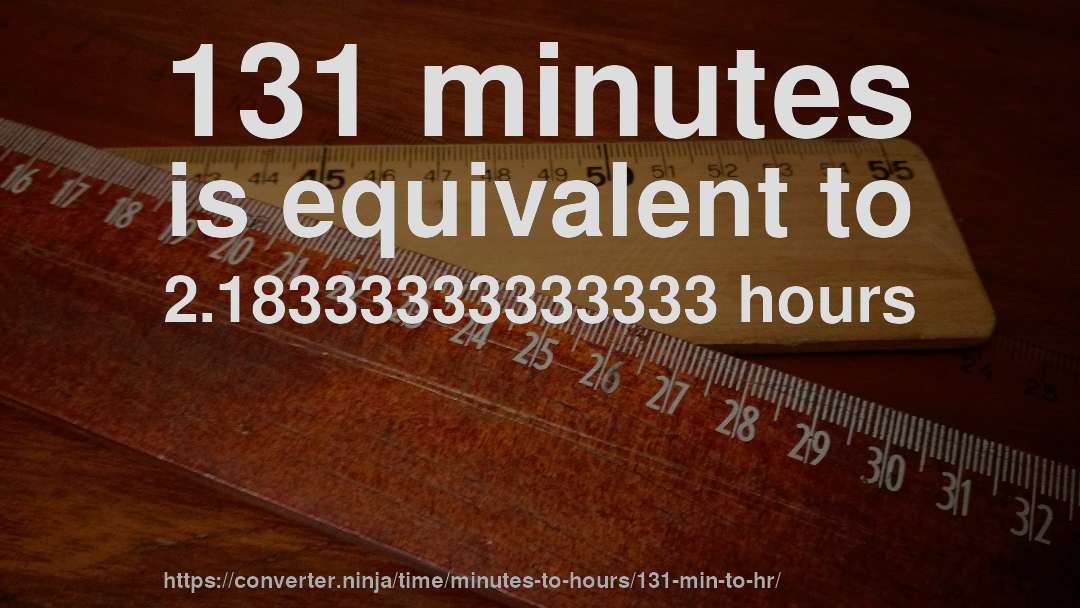131 min to hr - How long is 131 minutes in hours? [CONVERT] ✔

131 minutes is equivalent to 2.18333333333333 hours.
We know (by definition) that: 1 min ≈ 0.016666667 hr
We can set up a proportion to solve for the number of hours.
1 min 131 min ≈ 0.016666667 hr x hrNow, we cross multiply to solve for our unknown x:
x hr ≈ 131 min 1 min * 0.016666667 hr → x hr ≈ 2.183333377 hrConclusion: 131 min ≈ 2.183333377 hr
The inverse of the conversion factor is that 1 hour is equal to 0.458015267175573 times 131 minutes.
It can also be expressed as: 131 minutes is equal to 1 0.458015267175573 hours.
Approximation
An approximate numerical result would be: one hundred and thirty-one minutes is about two point one eight hours, or alternatively, a hour is about zero point four six times one hundred and thirty-one minutes.
Units involved
This is how the units in this conversion are defined:
Minutes
"The minute is a unit of time or of angle. As a unit of time, the minute is equal to 1⁄60 (the first sexagesimal fraction) of an hour, or 60 seconds. In the UTC time standard, a minute on rare occasions has 61 seconds, a consequence of leap seconds (there is a provision to insert a negative leap second, which would result in a 59-second minute, but this has never happened in more than 40 years under this system). As a unit of angle, the minute of arc is equal to 1⁄60 of a degree, or 60 seconds (of arc). Although not an SI unit for either time or angle, the minute is accepted for use with SI units for both. The SI symbols for minute or minutes are min for time measurement."
Hours
"Midnight (or noon) on a 12-hour analog clock An hour is a unit of time conventionally reckoned as 1⁄24 of a day and scientifically reckoned as 3,599–3,601 seconds, depending on conditions.The seasonal, temporal, or unequal hour was established in the ancient Near East as 1⁄12 of the night or daytime. Such hours varied by season, latitude, and weather. It was subsequently divided into 60 minutes, each of 60 seconds. Its East Asian equivalent was the shi, which was 1⁄12 of the apparent solar day; a similar system was eventually developed in Europe which measured its equal or equinoctial hour as 1⁄24 of such days measured from noon to noon. The minor variations of this unit were eventually smoothed by making it 1⁄24 of the mean solar day, based on the measure of the suns transit along the celestial equator rather than along the ecliptic. This was finally abandoned due to the minor slowing caused by the Earths tidal deceleration by the Moon.In the modern metric system, hours are an accepted unit of time equal to 3,600 seconds but an hour of Coordinated Universal Time (UTC) may incorporate a positive or negative leap second,[a] making it last 3,599 or 3,601 seconds, in order to keep it within 0.9 seconds of universal time, which is based on measurements of the mean solar day at 0° longitude."
[1] The precision is 15 significant digits (fourteen digits to the right of the decimal point).
Results may contain small errors due to the use of floating point arithmetic.ncG1vNJzZmibn6PDpr7Tnqlnppmjt6J706Kknmednru2wMSsZK2nXZ28tr7SaGhsaV2itq9506hkoapf